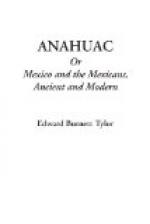As for the players, they sat round the table, carefully noticing the course of the games, and regulating their play accordingly, as they do at Baden-Baden and Hombourg. I suppose that now and then these scientific calculators must be told that their whole theory of chances is the most baseless delusion, but they certainly do not believe it; and at any rate this curious pseudo-science of winning by skill at games of pure chance will last our time, if not longer.
On some tables there were as much as three or four thousand gold ounces. This struck us the more because we had often tried to get gold coin for our own use, instead of the silver dollars, the general currency of the country, of which twenty pounds’ worth to carry home on a hot day was enough to break one’s heart. We often tried to get gold, but the answer was always that what little there was in the country was in the hands of the gamblers, whose operations could not be worked on a large scale without it.
The prevalence of mining, as a means of getting wealth, has contributed greatly to make the love of gambling an important part of the national character. Silver-mining in the old times was a most hazardous speculation, and people engaged in it used to make and lose great fortunes a dozen times in their lives. The miners worked not on fixed wages, but for a share of the produce, and so every man became a gambler on his own account. To a great extent the same evils prevail now, but two things have tended to lessen them. Poor ores are now worked profitably which used to be neglected by the miners; and, as these ores occur in almost inexhaustible masses, their mining is a much less speculative affair than the old system of mining for rich veins. Moreover, the men are, in some of the largest mines, paid by the day, so that their life has become more regular. In many places, however, the work is still done on shares by the miners, who pass their lives in alternations of excessive riches and all kinds of extravagance, succeeded by times of extreme poverty.




